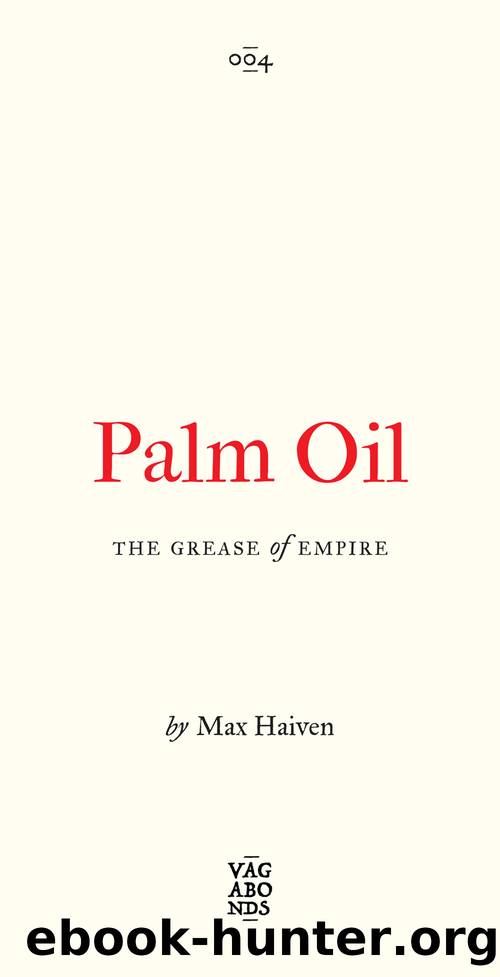Palm Oil by Max Haiven

Author:Max Haiven
Language: eng
Format: epub
Publisher: Pluto Press
Whose surplus?
In order to justify the constant expansion of the palm oil industry, its proponents often play on common anxieties of a growing global population in need of affordable nutrition.202 These discourses implicitly or explicitly cite myths of overpopulation that have their origins in racist eugenics and are frequently used to justify or rationalize the sacrifice of peopleâtypically racialized or otherwise stigmatized peopleâin the name of the abstract greater good.203 What such discourses render invisible in the broader capitalist socioeconomic contexts in which populations and resources become abundant and scarce, as well as the vast differentials in consumption between the worldâs rich and poor.204
Within this context, palm oil feeds hundreds of millions of people who are cast to the bottom of global hierarchies of income and security and who are often excluded from the formal capitalist economy completely, such that they can only afford this artificially cheapened fat. Their own socially-embedded physical reproduction, the metabolism of food into energy to keep a heart beating or a mind thinking, depends on palm oil. The E. guineensis metabolism depends on the conversion of sunlight, water and soil-bound nutrients into fleshy seedpods. Capitalism metabolizes these seedpods into cheapened food than can be consumed a world away. It is a chain of metabolic processes which begin in sunlight and ends in human labor power, that is mediated by capitalist relations and the artificial scarcity of money that compels each individual along the chain to make choices they otherwise might not make or might make otherwise.
For Georges Bataille, all earthly societies practice sacrifice, based on the universal fact of the sublime, near infinite magnitude of the solar radiation responsible for almost all life on earth. Whereas a long lineage of European economic thinkers presumed that all society is necessarily about the management of scarcity, in Batailleâs heretical view the problem was, rather an encrypted abundance: There is too much energy, too much life, so much that it jeopardizes the legitimacy of systems and structures of power based on the presumption of scarcity. Here, wealth and scarcity appear as human constructs, terms defined not by objective material facts but that emerge from the way a society is organized. Objects and people are made valuable and defined as scarce in ways that justify and reproduce social power. This arbitrary social order of wealth and scarcity is threatened by the undeniable reality of solar abundance and so societies necessarily invent rituals and practices to relieve themselves of wealth through sacrifice. Yes, of course: wealth materialized in precious objects or embodied in valuable animals, whose sacrifice was said to please the gods. But also, the sacrifice of that most invaluable thing, the creator of value itself: people. For Bataille, a witness to two world wars and much else besides, human sacrifice was far from abolished in European modernity, it had only taken new forms. In a society convinced of the inevitable fact of scarcity, sacrifice became a public secret, exercised and justified through the cold logic of the market or the pious justice of the state.
Download
This site does not store any files on its server. We only index and link to content provided by other sites. Please contact the content providers to delete copyright contents if any and email us, we'll remove relevant links or contents immediately.
| Natural Resource Extraction | Oil & Energy |
Life 3.0: Being Human in the Age of Artificial Intelligence by Tegmark Max(4536)
The Sports Rules Book by Human Kinetics(3612)
ACT Math For Dummies by Zegarelli Mark(3573)
The Age of Surveillance Capitalism by Shoshana Zuboff(3445)
Blood, Sweat, and Pixels by Jason Schreier(3148)
Unlabel: Selling You Without Selling Out by Marc Ecko(3002)
Urban Outlaw by Magnus Walker(2958)
Hidden Persuasion: 33 psychological influence techniques in advertising by Marc Andrews & Matthijs van Leeuwen & Rick van Baaren(2801)
The Pixar Touch by David A. Price(2752)
Bad Pharma by Ben Goldacre(2742)
Project Animal Farm: An Accidental Journey into the Secret World of Farming and the Truth About Our Food by Sonia Faruqi(2672)
Brotopia by Emily Chang(2600)
The Content Trap by Bharat Anand(2505)
Slugfest by Reed Tucker(2434)
The Airbnb Story by Leigh Gallagher(2386)
Kitchen confidential by Anthony Bourdain(2329)
Coffee for One by KJ Fallon(2024)
Smuggler's Cove: Exotic Cocktails, Rum, and the Cult of Tiki by Martin Cate & Rebecca Cate(2002)
Beer is proof God loves us by Charles W. Bamforth(1945)
